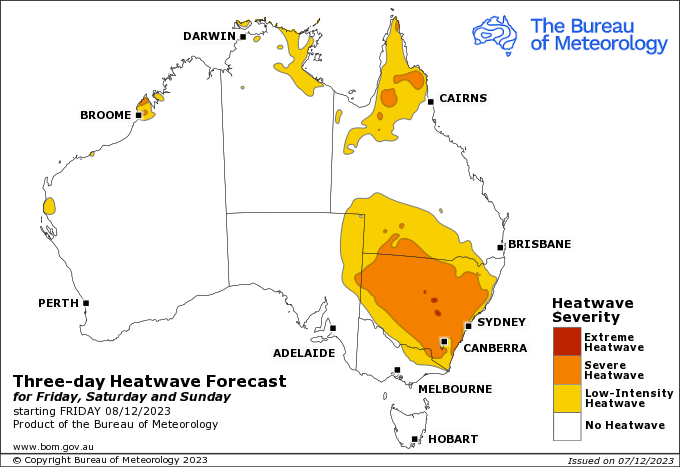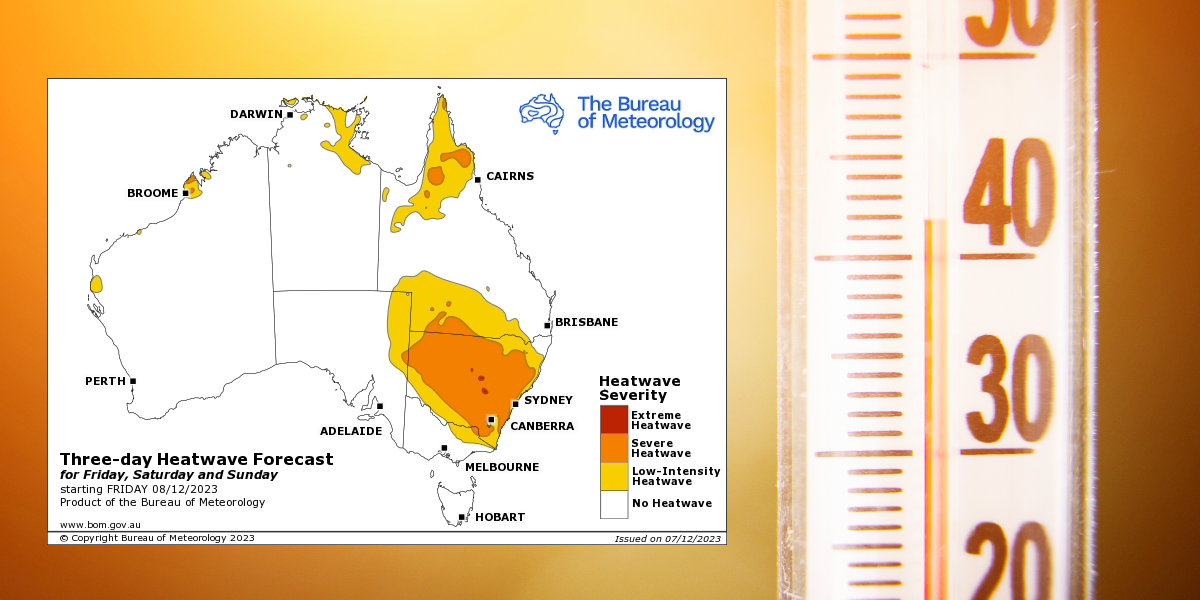The Bureau of Meteorology is predicting severe heatwaves across most of the state over the next coming days, prompting concern about vulnerable people and workers.
A severe heatwave warning was issued yesterday for all of the North West Slopes and Plains and most of the Northern Tablelands. Maximum temperatures are expected in the low to mid forties, reaching the mid thirties in the normally much cooler high country. The heatwave conditions are expected to ease from the southwest over the weekend with a cooler change moving through.
Armidale was named as a location likely to be significantly impacted by the heatwave with unusually hot conditions, expecting a top of 33 today and staying in the mid thirties all week. Inverell is looking at a temps around 37, while Tamworth, Moree, and Narrabri are all expected to see the mercury pass 40 more than once over the next 7 days.

SafeWork NSW is urging workers and businesses to start planning for how they will stay safe during the extreme conditions. Employers have the primary duty of care for employees and are encouraged to develop a workplace heat management plan in consultation with their health and safety representatives and workers to ensure everyone stays safe when the temperature rises.
Employers who have workers completing tasks outside must do their best to eliminate extended periods of sun exposure. This could be by providing shade, rotating tasks to reduce exposure, scheduling work to cooler times of the day and providing personal protective equipment such as hats, long sleeve shirts and sunscreen.
Tips on developing a heat management plan and managing extreme heat in the workplace can be found on the SafeWork website.
Any worker who feels their workplace is unsafe can anonymously report their concerns directly to SafeWork NSW on 13 10 50 or via the ‘Speak Up Save Lives’ app.
Head of SafeWork Trent Curtin says it’s important businesses and workers start to talk about the procedures they will use to keep everyone safe from heat-related illnesses.
“Workers are reminded to listen to their body when the temperature rises and to drink plenty of water. It is vital you do not replace water with soft drinks, energy drinks or coffee as these can dehydrate you further.”
“If the weather becomes too hot and can’t be avoided then the job might have to be stopped. Worker safety must come first,” he said.
Meanwhile, the Australian Red Cross is urging New South Wales residents to take action and plan how they will manage forecasted heatwaves in the coming days. Australian Red Cross State Director for New South Wales, Kate Miranda said heatwaves are more than just another hot day.
“These weather events can be extremely dangerous, and it’s vital that people have a plan to keep cool, especially those who are vulnerable, older or unwell.” Ms Miranda said.
“When temperatures rise, simple steps like keeping hydrated, staying indoors and wearing light clothing can make a significant difference.
Australian Red Cross tips for coping with the heat include:
- Drink regularly, even if you don’t feel thirsty. Water is the best option. Avoid alcohol, tea, coffee and sugary or fizzy drinks as they make dehydration worse.
- Eat little and often, rather than large meals. Try to eat more cold food, particularly salads and fruit, which contain water.
- Stay indoors in the coolest rooms of your house or in the shade during the hottest part of the day.
- Take cool showers and splash yourself with cold water several times a day, particularly your face and the back of your neck. A loose, cotton, damp cloth or scarf on the back of the neck can help you stay cool.
- Air flow: Make sure there is sufficient air circulation, either from an air conditioner or by leaving a secured window or door open.
- Find the shade: If you must go out, stay in the shade. Wear a hat and light-coloured, loose-fitting clothes, preferably made of natural fibres. Wear sunglasses and apply sunscreen with a sun protection factor of 30 to exposed skin. If you will be outside for some time, take plenty of water with you.
- Look out for your family, friends and neighbours: If you know someone who might be susceptible to heat stress, stop by or give them a call and make sure they know what to do to stay cool.
Like what you’re reading? Support the New England Times to keep providing hyper-local news, for the New England and by the New England, pay wall free. Make a small contribution today.


